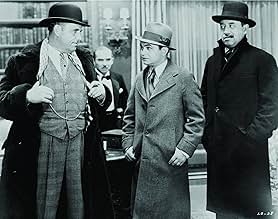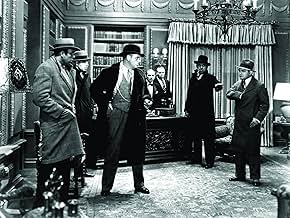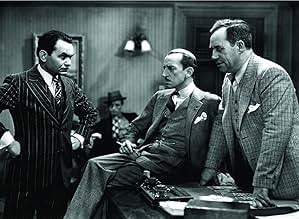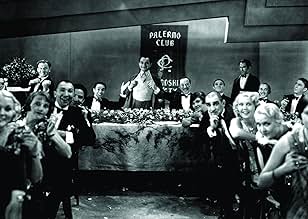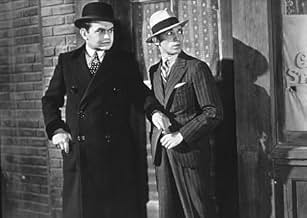NOTE IMDb
7,2/10
15 k
MA NOTE
Un petit truand déménage dans une grande ville pour tenter sa chance.Un petit truand déménage dans une grande ville pour tenter sa chance.Un petit truand déménage dans une grande ville pour tenter sa chance.
- Réalisation
- Scénario
- Casting principal
- Nommé pour 1 Oscar
- 2 victoires et 1 nomination au total
Thomas E. Jackson
- Sgt. Flaherty
- (as Thomas Jackson)
Nicholas Bela
- Ritz Colonna
- (as Nick Bela)
Ernie Adams
- Cashier
- (non crédité)
Elmer Ballard
- Bat Carilla
- (non crédité)
Ferike Boros
- Mrs. Passa
- (non crédité)
Kernan Cripps
- Detective
- (non crédité)
George Daly
- Machine-Gunner
- (non crédité)
Adolph Faylauer
- New Year's Celebrant
- (non crédité)
Avis à la une
Edward G. Robinson's memorable performance in "Little Caesar" is rightfully one of his best-remembered roles. While he deserves also to be remembered for his versatility in many other performances as well, it's easy to see why this one in particular is still remembered. Along with James Cagney's role in "The Public Enemy", Robinson's portrayal here helped to exemplify the kinds of characters that for some time defined the genre.
The story is not without interest in itself, as it follows the rise and decline of various gangsters and their followers. The fragile nature of their form of 'power' comes across quite clearly, and of course there is plenty of action as well. It's not especially subtle, but it wasn't supposed to be. The supporting cast all give solid performances, but Robinson's character is always the center of attention. Douglas Fairbanks, Jr. has the most interesting character to work with among the supporting roles.
The story moves at a good pace, especially given its release date, and is over almost before you know it. Even aside from Robinson, it's one of the better features of the earliest years of sound movies, handling the dialogue and sound better than most. Like "The Public Enemy", it was set in its own time, but it's a good production overall that still works rather well decades later.
The story is not without interest in itself, as it follows the rise and decline of various gangsters and their followers. The fragile nature of their form of 'power' comes across quite clearly, and of course there is plenty of action as well. It's not especially subtle, but it wasn't supposed to be. The supporting cast all give solid performances, but Robinson's character is always the center of attention. Douglas Fairbanks, Jr. has the most interesting character to work with among the supporting roles.
The story moves at a good pace, especially given its release date, and is over almost before you know it. Even aside from Robinson, it's one of the better features of the earliest years of sound movies, handling the dialogue and sound better than most. Like "The Public Enemy", it was set in its own time, but it's a good production overall that still works rather well decades later.
Seminal gangster film about the rise and fall of Enrico Bandello, a Chicago hoodlum, based on the novel by W.R. Burnett. The prototype for Enrico was, like so many other gangster heroes, mobster Al Capone. If you know a little bit about his life story, you got your basic gangster plot for practically all films that followed, like Tony Camonte in SCARFACE.
This film was the first of "the big three", together with PUBLIC ENEMY (1931) and SCARFACE: SHAME OF THE NATION (1932) and provided the blueprint for the modern gangster crime flic. It was the first gangster film to reach a wide audience and launched Edward G. Robinson to stardom. The story is simple and straightforward and might feel a little overly familiar to modern audiences, but the film lost little of its power and still holds up pretty well. It's a tough movie, but mostly tough talking with not much violence on screen.
But the film would probably be instantly forgettable without Robinson's superb performance. Whenever he's on screen, his presence is incredibly menacing. The rest of the cast is so so, but Thomas Jackson as Flaherty, Rico's nemesis, gives a wonderfully cynical performance, mocking Rico and all the other gangsters. Like most other early gangster films, it lacks the real emotional depth and complexity that came with later films, like the French gangster films of the fifties or THE GODFATHER and was made primarily as popular entertainment. Pleasant entertainment nevertheless with Edward G. Robinson portraying the first classic gangster role in screen history.
Camera Obscura --- 8/10
This film was the first of "the big three", together with PUBLIC ENEMY (1931) and SCARFACE: SHAME OF THE NATION (1932) and provided the blueprint for the modern gangster crime flic. It was the first gangster film to reach a wide audience and launched Edward G. Robinson to stardom. The story is simple and straightforward and might feel a little overly familiar to modern audiences, but the film lost little of its power and still holds up pretty well. It's a tough movie, but mostly tough talking with not much violence on screen.
But the film would probably be instantly forgettable without Robinson's superb performance. Whenever he's on screen, his presence is incredibly menacing. The rest of the cast is so so, but Thomas Jackson as Flaherty, Rico's nemesis, gives a wonderfully cynical performance, mocking Rico and all the other gangsters. Like most other early gangster films, it lacks the real emotional depth and complexity that came with later films, like the French gangster films of the fifties or THE GODFATHER and was made primarily as popular entertainment. Pleasant entertainment nevertheless with Edward G. Robinson portraying the first classic gangster role in screen history.
Camera Obscura --- 8/10
There's a villain and he's out to make his name, Caesar Enrico Bandello, just has no shame, with a cannon in his hand, shoot you down just where you stand, there's no way that he'll be stopped, he won't be tamed. He's taken over a small gang, after a heist, where the crime commissioner has paid a price, a rival boss then shoots him down, but it only leaves a frown, then 'Big Boy' gives him Chicago's Northside vice.
Isn't Edward G. Robinson always spellbinding, especially in his more devious roles. The ascent and decent of a larger than life ego, the cost to others and the ultimate price paid in the quest for power.
Isn't Edward G. Robinson always spellbinding, especially in his more devious roles. The ascent and decent of a larger than life ego, the cost to others and the ultimate price paid in the quest for power.
Mervyn Leroy directs this excellent crime drama. Exceptional camera work for the early '30s. Edward G. Robinson plays Caesar Enrico "Rico" Bandello a small time hoodlum that becomes an underworld crime boss. The rise and fall of Rico and his dealings with rival gangs and pushing his way to the top makes for a classic. Very good supporting cast featuring:Douglas Fairbanks Jr., Sidney Blackner, Glenda Ferrell and George E. Stone. Robinson makes this role memorable for the ages. A must see for gangster movie fans.
LITTLE CAESAR was made at a critical time in U.S. history. Prohibition was in, the depression was overwhelming, and mobsters were running rampant. I don't think the filmmakers realized it, but they have made a movie that paints the "Mafia" as glamorous and flashy. A message appears before the flick, telling the public how "we" must stop gangsters like Tom Powers (James Cagney,PUBLIC ENEMY) and Rico, (Edward G. Robinson, LITTLE CAESAR). The movie probably had youngsters and adults alike wanting to live the life of a man who had a city in his grasp, and no one who was anyone was "yellow". All seriousness aside, this blueprint of a long history of mob pictures is silly, dated, and damn watchable. You can't take your eyes off the screen.
A film with dialogue like the ultimate cliche "Go on. I'm...done for" must be a waste of time right? Not if you appreciate pre-historic cinema and the Vitaphone films of the early talkie period. Actors like the great Edward G. Robinson were born to talk and deliver lines at machine gun pace. This is what the audiences of the time were looking for. And that mug. Audiences would not see such a face on a gangster until Brando's GODFATHER. If you love GOODFELLAS, THE GODFATHER, Cagney and Bogart films, and even PULP FICTION, this is a must see. Experience an American original - the first potent "La Cosa Nostra" movie. Rat tat tat tat tat!!!
RATING: 10 of 10
A film with dialogue like the ultimate cliche "Go on. I'm...done for" must be a waste of time right? Not if you appreciate pre-historic cinema and the Vitaphone films of the early talkie period. Actors like the great Edward G. Robinson were born to talk and deliver lines at machine gun pace. This is what the audiences of the time were looking for. And that mug. Audiences would not see such a face on a gangster until Brando's GODFATHER. If you love GOODFELLAS, THE GODFATHER, Cagney and Bogart films, and even PULP FICTION, this is a must see. Experience an American original - the first potent "La Cosa Nostra" movie. Rat tat tat tat tat!!!
RATING: 10 of 10
Le saviez-vous
- GaffesRico is hit by the bullet sufficiently to require bandaging by Scabby, but the overcoat he was wearing has no bullet hole in it, nor is there any trace of blood in the subsequent scene in Little Arnie's office.
- Citations
[last lines]
Caesar Enrico Bandello: Mother of Mercy! Is this the end of Rico?
- Versions alternativesIn the 1954 re-release, a foreword crawl was added, warning that the "heroes" of Little Caesar and L'ennemi public (1931) represent "a problem that sooner or later we, the public, must solve." This version is often shown on cable channels.
- ConnexionsFeatured in Hollywood: The Fabulous Era (1962)
Meilleurs choix
Connectez-vous pour évaluer et suivre la liste de favoris afin de recevoir des recommandations personnalisées
- How long is Little Caesar?Alimenté par Alexa
Détails
- Date de sortie
- Pays d’origine
- Langue
- Aussi connu sous le nom de
- Little Caesar
- Lieux de tournage
- Société de production
- Voir plus de crédits d'entreprise sur IMDbPro
- Durée
- 1h 19min(79 min)
- Couleur
Contribuer à cette page
Suggérer une modification ou ajouter du contenu manquant



